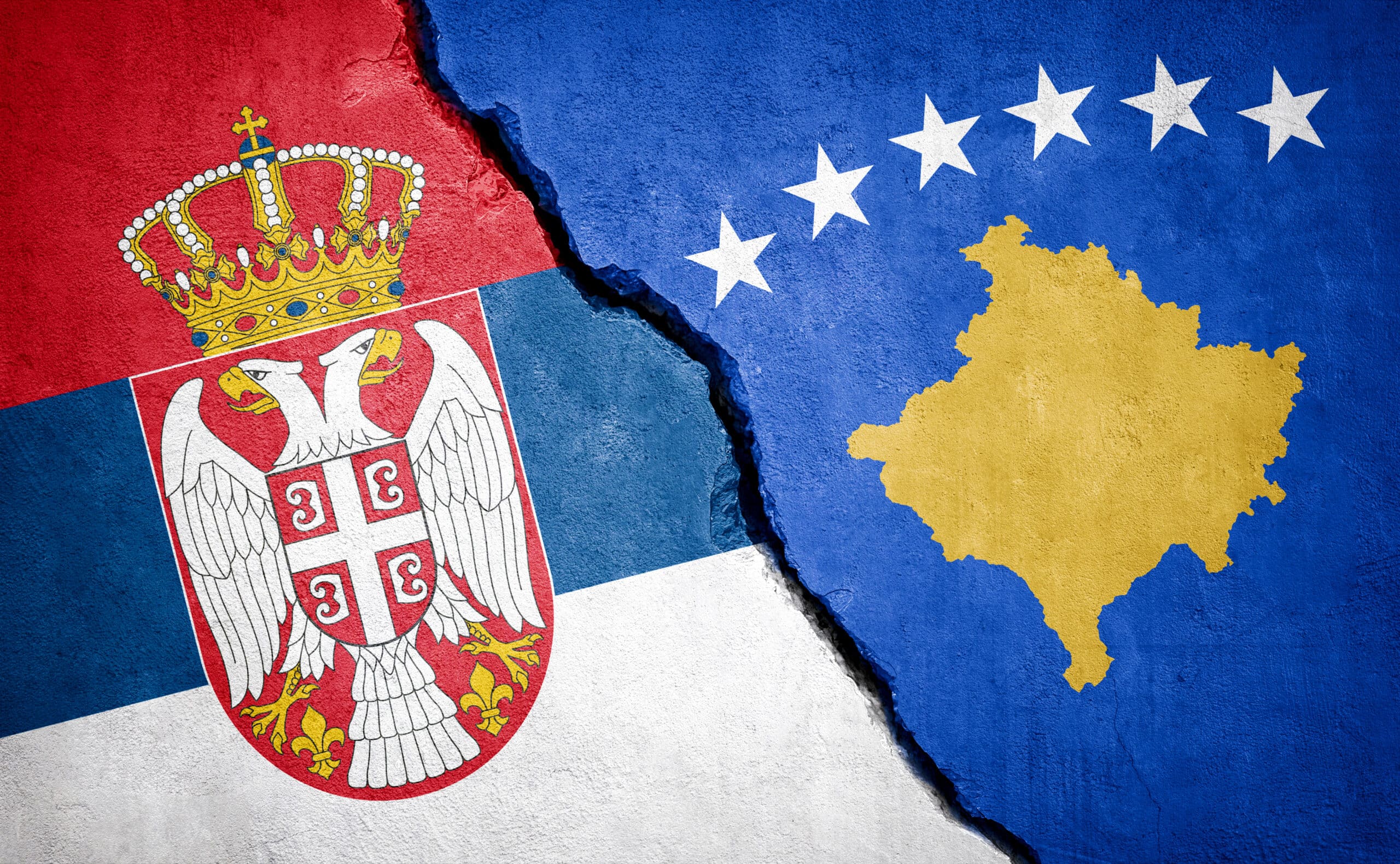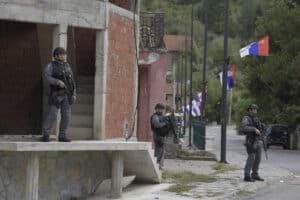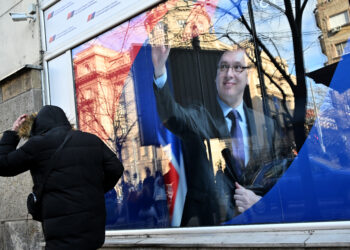Brussels – One issue is closed, but another is about to inflame relations between Pristina and Belgrade. Serbia’s president, Aleksandar Vučić, warned that he would use “all available means against the ban of the dinar in Kosovo” after the announcement by the Central Bank of Kosovo that a Cash Transaction Regulation, which envisages that the euro will be recognized as the only currency allowed for payments in the country, will come into force on February 1. Vučić directly called into play the president of the European Commission, Ursula von der Leyen: “I asked that you use all your strength and energy to make sure that such a thing does not happen.”
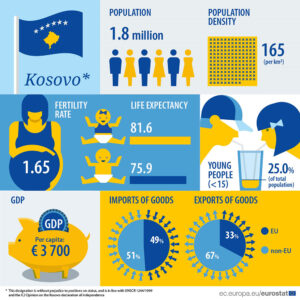 Once again – just like the license plate issue that has inflamed relations between Serbia and Kosovo over the last two and a half years and resolved only two weeks ago – it marks the worsening of relations between the two Balkan countries that risks having severe effects on northern Kosovo inhabited by a sizeable Serbian ethnic minority. In the face of a clear position of the youngest European state (whose independence in 2008, however, is not recognized by Belgrade) on the need to introduce a Regulation to combat money counterfeiting and other forms of financial crimes, Belgrade responded with an opposition in principle and based on a non-factual interpretation of reality. Endorsing the view of the main Serbian-Kosovar party, Lista Srpska, according to which this would be “expulsion of Serbs without the use of arms,” Serbian President Vučić spoke explicitly of a “dinar ban” in Kosovo.
Once again – just like the license plate issue that has inflamed relations between Serbia and Kosovo over the last two and a half years and resolved only two weeks ago – it marks the worsening of relations between the two Balkan countries that risks having severe effects on northern Kosovo inhabited by a sizeable Serbian ethnic minority. In the face of a clear position of the youngest European state (whose independence in 2008, however, is not recognized by Belgrade) on the need to introduce a Regulation to combat money counterfeiting and other forms of financial crimes, Belgrade responded with an opposition in principle and based on a non-factual interpretation of reality. Endorsing the view of the main Serbian-Kosovar party, Lista Srpska, according to which this would be “expulsion of Serbs without the use of arms,” Serbian President Vučić spoke explicitly of a “dinar ban” in Kosovo.
In fact, the Kosovo Constitution provides for the exclusive use of the euro, and the Regulations that will come into force in a little over a week only stipulate how to apply this, not including voluntary transactions between parties using currencies other than the euro. In other words, within Kosovo’s national borders, the euro will be the only exchange currency and the currency for deposits in bank accounts, while the Serbian dinar can still be traded on par with the Albanian lek or the dollar. However, the decision will impact the country’s northern regions of ethnic Serb-majority, where some banks and public services use the Serbian dinar exclusively as their currency, never having adjusted to Pristina’s adoption of the euro in 2002 (even before independence).
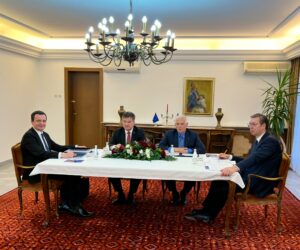
“We are still analyzing this decision, the reasons for its adoption, and the possible implications,” European External Action Service (EEAS) spokesman Peter Stano explained in the daily conference with the European press last Friday (January 19). Stalling for time, Stano called on Serbia and Kosovo to address the issue as part of the EU-facilitated Pristina-Belgrade dialogue (even though not included on the agenda): “We expect them to avoid uncoordinated actions that are not conducive to the normalization of relations and that could have a negative impact on stability on the ground.” The EU is struggling to manage the tensions between the two countries after 2023 began amid high hopes – the February 27 Brussels Agreement defined the specific commitments and the March 18 understanding on implementation annex in Ohrid – and continued with increased diplomatic and field conflict.
The reasons for tension between Serbia and Kosovo
After the two 2021 summer meetings between PM Kurti and President Vučić in Brussels, the so-called license plate dispute broke out in northern Kosovo in mid-September. Initially, it was a diplomatic dispute between Pristina and Belgrade related to the Kurti government’s decision to impose the change of license plates on Serbian vehicles entering Kosovo territory, used in large part by the Serbian minority in the country. Thanks to EU mediation, the issue was temporarily resolved but the lack of a final solution inflamed the second half of 2022: in late July, the first roadblocks and barricades appeared among the most extremist part of the Serb-Kosovar minority, and two failed meetings between Vučić and Kurti in Brussels led to the continuation of the stalemate.
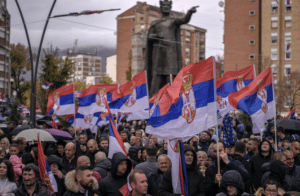
The situation worsened when Lista Sprska took over the reins of popular protest in northern Kosovo. On November 5, mass resignations of mayors, councilors, parliamentarians, judges, prosecutors, judicial personnel, and police officers from their respective national institutions were staged in protest against the phased plan for implementation of Serbian license plate replacement rules. Among those resigning were the mayors of Kosovska Mitrovica, Zubin Potok, Zvecan, and Leposavić, and therefore it was necessary to return to the polls in the four cities. At the same time, a compromise solution on the plates was reached on the night of November 23-24 in Brussels, even though the Serbian president threatened to boycott the EU-Western Balkans summit in Tirana because of the appointment of Nenad Rašić in the Kosovo government (instead of Lista Srpska leader Goran Rakić) as minister for Communities and Refugee Return. Rašić is the leader of the Democratic Progressive Party, a Serbian formation hostile to Belgrade.
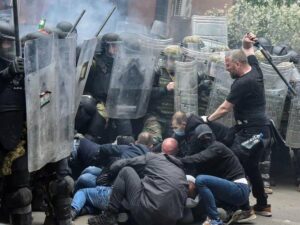
2022 ended with an escalation of tensions at border crossings in northern Kosovo after Pristina decided to send several hundred police officers to make up for those who resigned in November. Thanks to European and U.S. efforts, the barricades of the most extremist Serb-Kosovar fringe were dismantled only after a few weeks. The next crisis erupted on May 26, 2023. Violent protests erupted on May 29 as the newly elected mayors of Zubin Potok, Zvečan, Leposavić, and Kosovska Mitrovica led by Lista Srpska exponents erupted, turning into a guerrilla warfare that also involved soldiers from the NATO-led international KFOR mission. Tensions broke out over the Kurti government’s decision to bring in special police forces to allow mayors elected on April 23 to enter town halls in a controversial election round due to very low voter turnout.
On June 14, three Kosovar policemen were arrested/kidnapped by Serbian security services, for which the governments of Pristina and Belgrade accused each other ‘s law enforcement agencies of trespassing in a poorly controlled border area used by smugglers trying to avoid control. After weeks of unheeded, continued calls for calm and de-escalation, Brussels convened an emergency meeting with PM Kurti and President Vučić to get out of “crisis management mode.” On June 22, Serbia released the three Kosovar policemen. However, the tensions between Pristina and Belgrade ended up in the conclusions of the June 29-30 European Council.
Due to Pristina’s failure to take a “constructive attitude” toward de-escalating tension, Brussels imposed “temporary and reversible” measures against Kosovo in late June, which included suspending the work of the bodies of the Stabilization and Association Agreement. A four-stage roadmap was agreed on July 12 to remove these measures, but they are still in effect. Within days of an unsuccessful high-level meeting in Brussels, however, the situation between Serbia and Kosovo escalated with the terrorist attack that began in the early hours of September 24 near the Serbian Orthodox monastery in Banjska, when Kosovo police arrived to report an illegal checkpoint on the border with Serbia. After killing one policeman and wounding two others, a group of about 30 armed men entered the monastic complex, and clashes continued throughout the day. During the “clearing operation,” three of the terrorists died.
Post-September 24 developments showed obvious ramifications in neighboring Serbia. A video by a drone on the day of the attack showed that Milan Radoičić, deputy head of Lista Srpska, was among the attackers outside the monastery. On September 29, Radoičić himself confirmed that he led the armed attack: a confession that cast a long shadow not only over the participation of the Serb-Kosovar leadership in a strategy to destabilize the country but, more importantly, over Belgrade’s ability to interfere in Pristina’s internal affairs. Added to this were revelations about the presence of Milorad Jevtić, a close associate of the Serbian president’s son, Danilo Vučić. According to the findings of an investigation by Balkan Insight, the weapons used in the attack were manufactured in Serbia in 2022, and some mortar shells and grenades were repaired in the Serbian state maintenance centers in 2018 and 2021.
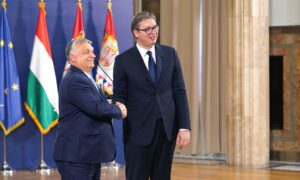
Also worsening relations between Kosovo and Serbia was the U.S. warning of a Serbian “major military deployment” along the administrative border. The threat did not materialize — according to Prime Minister Kurti, an annexation of northern Kosovo was planned with “a coordinated attack on 37 separate positions” — but the European Union began to reflect on imposing the same measures in force against Pristina against Belgrade. “We need to make sure that we make the best use of the tools the EU has to encourage both sides to contribute to a solution of the crisis,” EEAS spokesman Peter Stano explained to Eunews. But the green light for the measures against Serbia requires unanimity in the Council, and Vučić’s closest ally inside the Union – the Hungarian premier, Viktor Orbán – vetoed them. The only positive news, at the moment, is the resolution of the ‘license plates’ row between Serbia and Kosovo, thanks to the decision between late 2023 and early 2024 on mutual recognition for vehicles entering the border.
Find more insights on the Balkan region in the newsletter BarBalcani hosted by Eunews
English version by the Translation Service of Withub